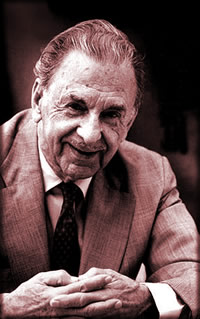<Back to Index>
- Aviator and Entrepreneur Jehangir Ratanji Dadabhoy Tata, 1904
- Writer Eyvind Johnson, 1900
- Brigadier General of the Union Army Alvan Cullem Gillem, 1830
PAGE SPONSOR

Jehangir Ratanji Dadabhoy Tata (29 July 1904 – 29 November 1993) was a pioneer aviator and important businessman of India. He was awarded India's highest civilian award, the Bharat Ratna in 1992 and the Legion of Honour from the French government in 1954.
J.R.D. Tata was born in Paris, France, the second child of Parsi father Ratanji Dadabhoy Tata and his French wife, Suzanne "Sooni" Brière. His father was a first cousin of Jamsedji Tata, a pioneer industrialist in India. As his mother was French, he spent much of his childhood in France and as a result, French was his first language. Tata also attended the French Foreign Legion. He attended the Cathedral and John Connon School, Bombay (now Mumbai). He did not continue beyond matriculation as mentioned in his biography Beyond The Last Blue Mountain by R M Lala. J.R.D. Tata was inspired early by aviation pioneer Louis Blériot,
and took to flying. On February 10, 1929 Tata obtained the first pilot
licence issued in India. He later came to be known as the father of
Indian civil aviation. He founded India's first commercial airline, 'Tata Airlines', in 1932, which in 1946 became Air India, now India's national airline. JRD
Tata joined Tata & Sons as an unpaid apprentice in 1925. In 1938,
at the age of 34, JRD was elected Chairman of Tata & Sons making
him the head of the largest industrial group in India. For decades, J R
D directed the huge Tata Group of companies, with major interests in
Steel, Engineering, Power, Chemicals and Hospitality. He was famous for
succeeding in business while maintaining high ethical standards - refusing to bribe politicians or use the black market. Under
his chairmanship, the assets of the Tata Group grew from $100 million
to over $5 billion. He started with 14 enterprises under his leadership
and half a century later on July 26, 1988, when he left, Tata &
Sons was a conglomerate of 95 enterprises which they either started or
in which they had controlling interest. JRD
was the trustee of Sir Dorabji Tata Trust from its inception in 1932
for over half a century. Under his guidance, this Trust established
Asia's first cancer hospital, the Tata Memorial Center for Cancer,
Research and Treatment, in Bombay in 1941. It also founded the Tata
Institute of Social Sciences (TISS, 1936), the Tata Institute of
Fundamental Research (TIFR, 1945), and the National Center for
Performing Arts. In 1945, he founded Tata Motors.
In 1948, JRD Tata launched Air India International as India's first
international airline. In 1953, the Indian Government appointed Babu as
Chairman of Air - India and a director on the Board of Indian Airlines -
a position JRD retained for 25 years. For his crowning achievements in
aviation, JRD was bestowed with the title of Honorary Air Commodore of India. In
1956, JRD Tata initiated a program of closer 'employee association with
management' to give workers a stronger voice in the affairs of the
company. He firmly believed in employee welfare and espoused the
principles of an eight hour working day, free medical aid, workers'
provident scheme, and workmen's accident compensation schemes, which
were later, adopted as statutory requirements in India. In 1968, he
founded Tata Consultancy Services.
In 1979, Tata Steel instituted a new practice: a worker being deemed to
be "at work" from the moment he leaves home for work till he returns
home from work. This made the company financially liable to the worker
for any mishap on the way to and from work. Now they have withdrawn all
this eight work and many liability schemes to the worker. In 1987, he founded Titan Industries. He died in Switzerland on 29 November 1993 at the age of 89. The Indian Parliament was adjourned in his memory in a gesture rarely accorded to non-Members of Parliament. He is buried at Père Lachaise Cemetery in Paris, France.